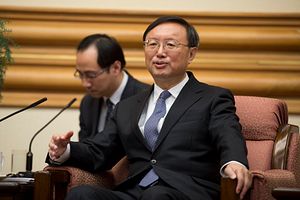Chinese State Councilor Yang Jiechi is in Japan this week for high-level political talks. He meet with Japanese National Security Advisor Shotaro Yachi on Tuesday, marking the second round of talks between Yang and Yachi in 2015. Yang also met with Japanese Prime Minister Shinzo Abe on Tuesday.
Yang’s trip to Toyko reciprocated Yachi’s visit to Beijing in July. At that meeting, and the one held this week, the two sides discussed a possible bilateral summit between Abe and Chinese President Xi Jinping. It was Yang and Yachi who helped pave the way for Xi and Abe’s handshake on the sidelines of the November 2014 APEC summit in Beijing. The third Yang-Yachi meeting in 12 months is a clear sign of thawing ties between Beijing and Tokyo.
However, thorny issues still plague the relationship. The July meeting was overshadowed by China’s negative reaction to Japan’s new security legislation passing the Lower House of the Diet (the bills have since passed the Upper House as well and become law). On Tuesday, it was history issues that threatened to overwhelm the meeting: Japan has protested UNESCO’s decision to register Chinese documents relating to the Nanjing Massacre in its “Memory of the World” program.
Though the obstacles to China-Japan relations haven’t gone anywhere, the return to dialogue is a clear indication that both sides want to improve their bilateral ties. China’s Foreign Ministry called the talks “an important measure taken by the two countries to enhance high-level strategic communication, build consensus and manage differences.”
Tomohiko Taniguchi, a special advisor to the Japanese Cabinet, told The Diplomat that Yang’s trip is a positive sign. “Given how important Yang Jiechi is in the central apparatchik of the Chinese Communist Party, I think everything seems to be on schedule” for a trilateral summit in South Korea between Xi, Abe, and Korean President Park Geun-hye, Taniguchi said.
“There is going to be an even greater chance for a bilateral between Xi and Abe to take place if the visit of Yang Jiechi is any indicator,” he added.
In their talks, both Yang and Yachi were full of positive words about the state of the relationship. “The Chinese government attaches great importance to China-Japan ties and is willing to maintain dialogue and contact with Japan,” Yang said, according to Xinhua. Yachi noted the positive momentum in China-Japan relations, with the resumption of political, economic, and security talks in the past year. However, according to Kyodo News, Yachi also spoke of Japan’s concern over China’s assertive actions in the East and South China Seas.
Despite progress, both sides are still in ice-breaking mode and are far from real breakthroughs, according to Taniguchi. “Both governments are working very hard to project an image that they have made a substantial step forward in improving their relationship, but it’s all about appearance, not substance,” he said.
Events such as Yang’s visit result in announcements about the improving relationship, but in truth “it’s all about buying time and making a good appearance to the international community,” Taniguchi explained. “And everyone knows that. Underneath the surface, the situation has hardly changed.”
































